Презентация democracu in ancient greece




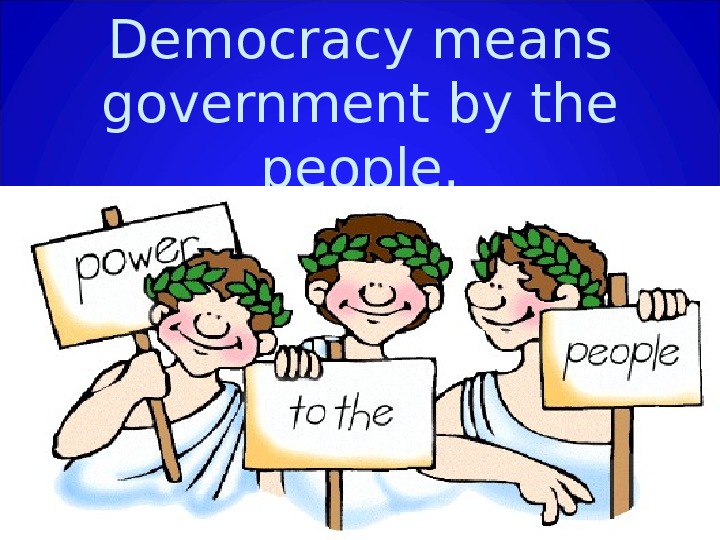


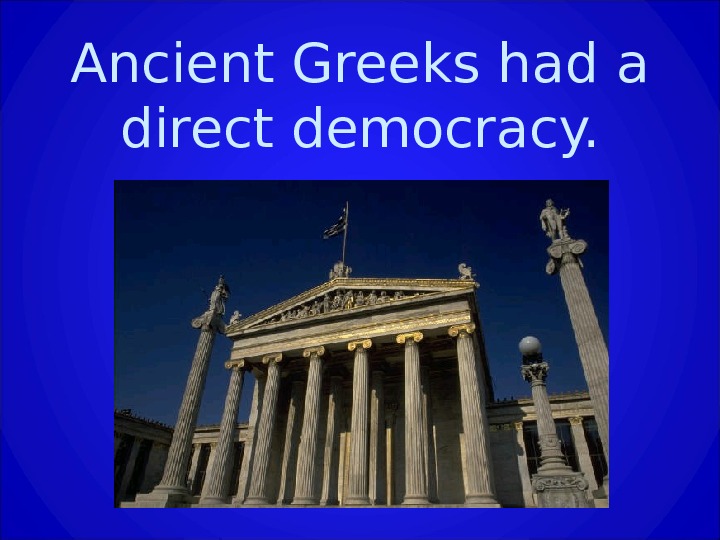


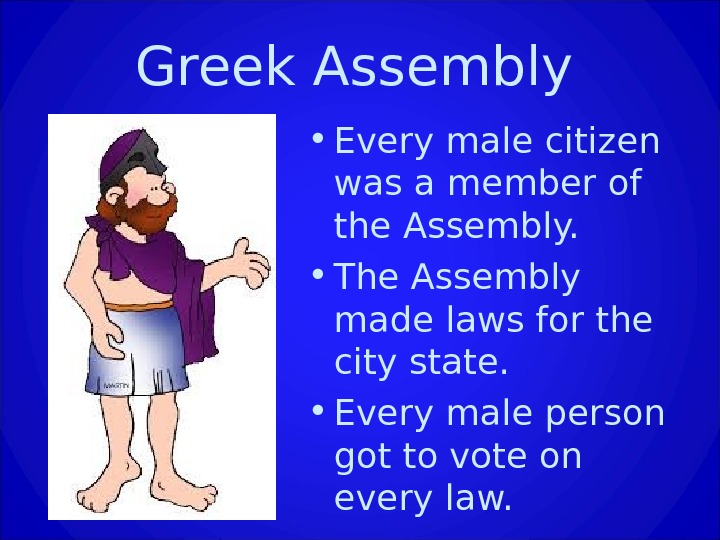
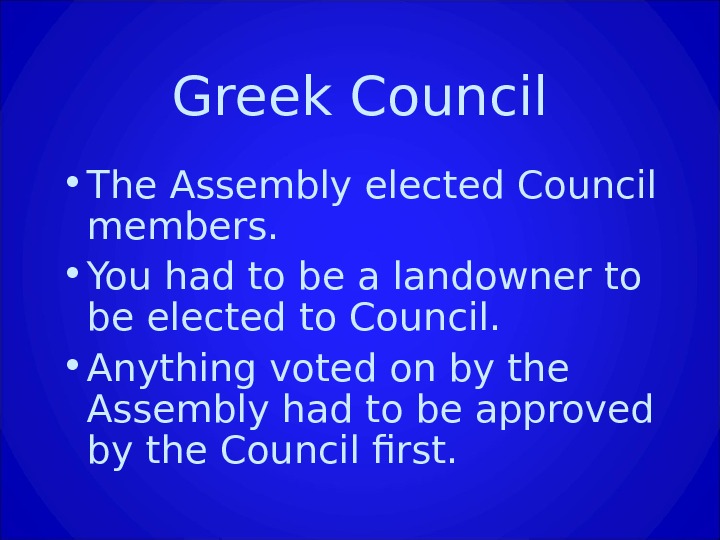


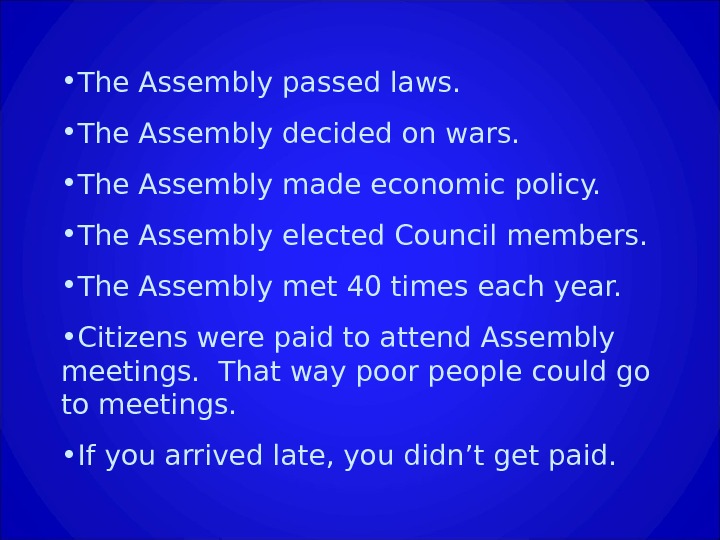

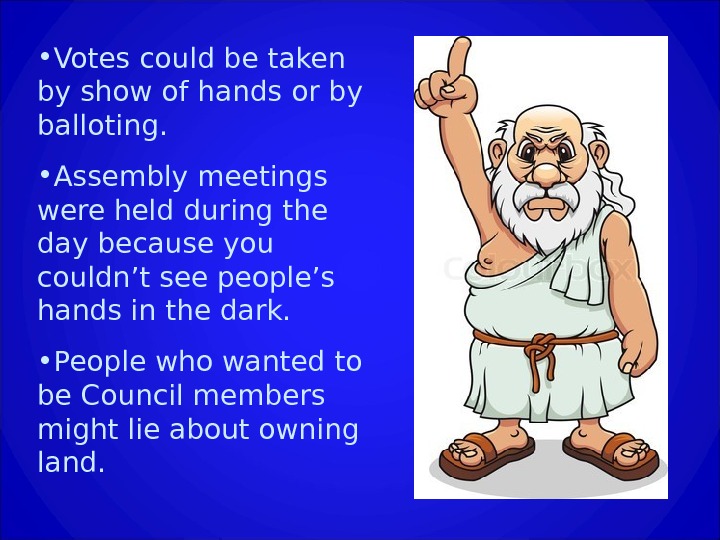
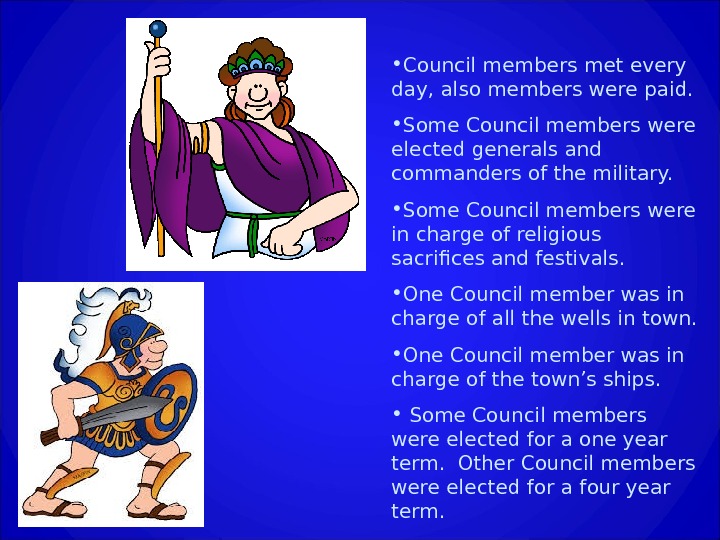

- Размер: 1.2 Mегабайта
- Количество слайдов: 18
Описание презентации Презентация democracu in ancient greece по слайдам
 Democracy in ancient Greece
Democracy in ancient Greece
 Monarch y- Power held in a family line Tyranny- One person rules Oligarch y- a small group of people rules Democracy- all people share the power
Monarch y- Power held in a family line Tyranny- One person rules Oligarch y- a small group of people rules Democracy- all people share the power
 Democracy • Ancient Greece was the birthplace of democracy.
Democracy • Ancient Greece was the birthplace of democracy.
 Democracy means government by the people.
Democracy means government by the people.
 Government by the people means… • every citizen gets a vote.
Government by the people means… • every citizen gets a vote.
 What is a citizen? • In ancient Greece a citizen was any free person who was born in a city state. • Men and women were citizens. • Only men could vote.
What is a citizen? • In ancient Greece a citizen was any free person who was born in a city state. • Men and women were citizens. • Only men could vote.
 Ancient Greeks had a direct democracy.
Ancient Greeks had a direct democracy.
 In a direct democracy people vote to make their own rules and laws.
In a direct democracy people vote to make their own rules and laws.

 Greek Assembly • Every male citizen was a member of the Assembly. • The Assembly made laws for the city state. • Every male person got to vote on every law.
Greek Assembly • Every male citizen was a member of the Assembly. • The Assembly made laws for the city state. • Every male person got to vote on every law.
 Greek Council • The Assembly elected Council members. • You had to be a landowner to be elected to Council. • Anything voted on by the Assembly had to be approved by the Council first.
Greek Council • The Assembly elected Council members. • You had to be a landowner to be elected to Council. • Anything voted on by the Assembly had to be approved by the Council first.
 Judges • Judges were the oldest branch of the government. • A person had to go through a year of testing to be a judge. • Once a person passed the testing, he became a judge for life.
Judges • Judges were the oldest branch of the government. • A person had to go through a year of testing to be a judge. • Once a person passed the testing, he became a judge for life.
 Trivia • The city state of Athens had the most famous direct democracy. Other city states patterned their governments after Athens. • There were 50, 000 to 60, 000 citizens of Athens and the surrounding countryside who were members of the Assembly. • If a vote was important, it took 6, 000 voters to pass a law.
Trivia • The city state of Athens had the most famous direct democracy. Other city states patterned their governments after Athens. • There were 50, 000 to 60, 000 citizens of Athens and the surrounding countryside who were members of the Assembly. • If a vote was important, it took 6, 000 voters to pass a law.
 • The Assembly passed laws. • The Assembly decided on wars. • The Assembly made economic policy. • The Assembly elected Council members. • The Assembly met 40 times each year. • Citizens were paid to attend Assembly meetings. That way poor people could go to meetings. • If you arrived late, you didn’t get paid.
• The Assembly passed laws. • The Assembly decided on wars. • The Assembly made economic policy. • The Assembly elected Council members. • The Assembly met 40 times each year. • Citizens were paid to attend Assembly meetings. That way poor people could go to meetings. • If you arrived late, you didn’t get paid.
 • Any citizen was allowed to speak on any topic. • If you spoke, but weren’t knowledgeable about the topic, you would be laughed out of the Assembly. • Any citizen could tell stories about any other citizen in the Assembly. People didn’t want to do bad things for fear they would be embarrassed at the Assembly.
• Any citizen was allowed to speak on any topic. • If you spoke, but weren’t knowledgeable about the topic, you would be laughed out of the Assembly. • Any citizen could tell stories about any other citizen in the Assembly. People didn’t want to do bad things for fear they would be embarrassed at the Assembly.
 • Votes could be taken by show of hands or by balloting. • Assembly meetings were held during the day because you couldn’t see people’s hands in the dark. • People who wanted to be Council members might lie about owning land.
• Votes could be taken by show of hands or by balloting. • Assembly meetings were held during the day because you couldn’t see people’s hands in the dark. • People who wanted to be Council members might lie about owning land.
 • Council members met every day, also members were paid. • Some Council members were elected generals and commanders of the military. • Some Council members were in charge of religious sacrifices and festivals. • One Council member was in charge of all the wells in town. • One Council member was in charge of the town’s ships. • Some Council members were elected for a one year term. Other Council members were elected for a four year term.
• Council members met every day, also members were paid. • Some Council members were elected generals and commanders of the military. • Some Council members were in charge of religious sacrifices and festivals. • One Council member was in charge of all the wells in town. • One Council member was in charge of the town’s ships. • Some Council members were elected for a one year term. Other Council members were elected for a four year term.
 Thanks for your attention ; )
Thanks for your attention ; )

